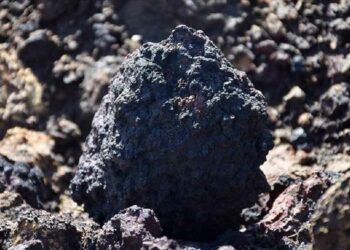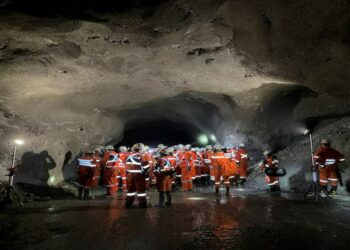The mining company response to COVID-19 has been well documented with leaders in the industry providing funds on a local and national scale, as well as shutting down susceptible operations, to tackle the virus outbreak and ‘flatten the curve’. The mining equipment, technology and services (METS) side is also doing its bit for the cause.
Many in the METS sector have been hit hard by COVID-19, with companies such as Caterpillar and Sandvik suspending operations in the face of supply chain issues and government-ordered shutdowns.
Despite these issues, these companies continue to innovate.
Vision enhancement specialist PROVIX has recently released a new thermal camera (pictured) to measure body and face temperatures that, it believes, will provide companies with a proactive COVID-19 detection method.
Its thermal vision camera systems are normally mentioned in IM in relation to providing more productive operations in drilling, mucking, hauling, blasting, tramming, loading and rescue operations, but the Ontario-based company has recently redirected its efforts to help detect infections that could be linked to the COVID-19 virus.
As PROVIX says, one of the main symptoms of a viral infection is an abnormal body temperature. “The normal body temperature ranges from 36.5° C to 37° C, and, if it exceeds 37.3° C, it is a true pathological fever,” the company said.
PROVIX’s non-contact temperature detector can achieve rapid preliminary temperature screening of people passing through the thermo-visual device, it said.
The company has improved and upgraded the facial recognition technology and automatic infrared facial temperature measurement for this new system, which will measure accurate forehead temperature and report any abnormalities with an alarm, PROVIX says.
“The equipment will automatically save the facial image, temperature record, passed time, name, ID card information record, etc,” the company explained.
While handheld temperature reading has been commonplace during the height of the pandemic, PROVIX says this method takes longer and puts those staff administering the test at risk of contracting the virus. Due to the consistent contact that comes with handheld body temperature devices, there is also a higher risk of spreading the virus further, PROVIX said.
There is also, typically, nowhere to record and retain temperature data.
PROVIX says its new thermal camera device can store up to 10,000 records, which includes temperature information and identity information, while providing an integrated video management platform that allows for video preview, playback, alarm management, electronic mapping and other functions.
Australia’s Gekko Systems has also been making the headlines in recent weeks; not for its innovative InLine Pressure Jigs for continuous gravity separation or other gold processing and low-energy mining solutions, but for its development of a ventilator.
A group of collaborators from Ballarat, Australia, including Gekko Technical Director, Sandy Grey, recently formed a response group seeking to deliver a viable and suitable ventilator for both local use and potential global application.
Grey brought the Gekko team’s knowledge of pneumatics, hydraulics, operating systems, mechatronics and control systems to ICU anaesthetists, including Doug Paxton and Michael Whitehead, to design a simple, robust, no frills ventilator.
The Gekko ventilator, or GeVentor, may have potential for remote site applications as it is designed to conserve oxygen consumption and function with extremely low power requirements. It has, this month, attracted the attention of the Victorian government, which has committed funds to preparing the Gekko ventilator design for manufacturing readiness.
Back in Ontario, FORTAI is only just coming off having developed the ADMMIT® autonomous mobile inventory management system for dynamic environments such as mines.
In the last month or so, it has redirected its resources to create sanitisation chambers for personal protective equipment (PPE), clothing, or other tools.
The company is looking to convert its mining supply chain and logistics product, the SmartCube™, into a solution that sanitises PPE or other devices used by front-line and essential workers across a range of industries, it said. By using the SmartCube technology, users can track and log PPE as it is sanitised.
The company will bring its Sanitization SmartCube into production within 30 days by leveraging its proven SmartCube technology, a powerful ecosystem of partners, and expertise from the INOVINTA Group of Companies, which includes BESTECH and SHYFTinc, the company said.
This is just a sample of the innovative work the METS sector is providing at a time of global need. Many other companies have also donated relevant equipment to the healthcare sector and provided facilities to house patients or produce the required products to protect people against the virus.










